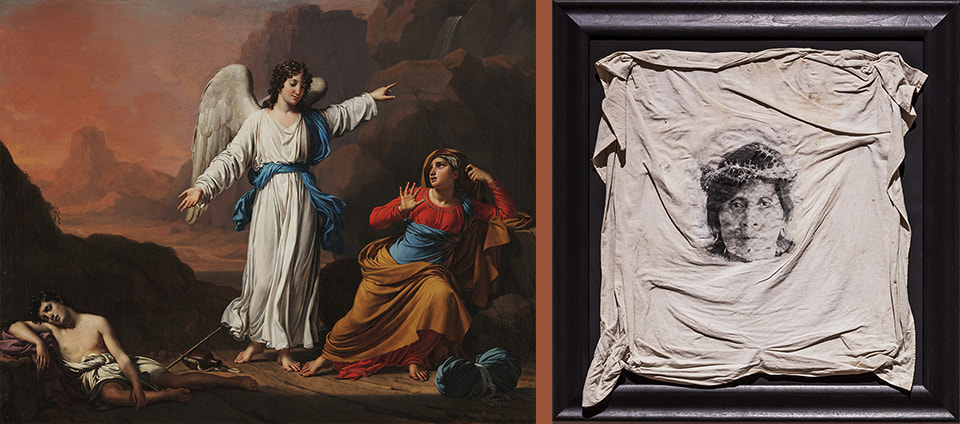MOCRA Presents Work from the Collections of Three Jesuit University Museums
This first-of-its-kind exhibition highlights the diversity, depth and quality of Jesuit University collections
ST. LOUIS, MO — Saint Louis University’s Museum of Contemporary Religious Art (MOCRA) announces a new exhibition that draws from the collections of three Jesuit university museums in a first-of-its-kind collaboration. “Double Vision: Art from Jesuit University Collections” includes works from MOCRA, the Haggerty Museum of Art (Marquette University) and Loyola University Museum of Art (Loyola University Chicago).
Featuring works from the fifteenth to twenty-first centuries, by artists including Keith Haring, Glenn Ligon, Kara Walker, Andy Warhol and May Wilson, “Double Vision” highlights the diversity, depth and quality of the three museum collections. “Double Vision” will be on view at MOCRA from Feb. 16 through May 22, 2022. More information can be found at slu.edu/mocra/exhibitions.
Art that “teaches, delights, and moves”
“Double Vision: Art from Jesuit University Collections” speaks to the unique role of art in Jesuit teaching as an instrument for finding meaning in life through imagination, feelings and reflection. The exhibition features 28 works from the Museum of Contemporary Religious Art (Saint Louis University), the Haggerty Museum of Art (Marquette University), and the Loyola University Museum of Art (Loyola University Chicago). Double Vision is co-curated by Lynne Shumow, Curator for Academic Engagement at the Haggerty Museum of Art, and David Brinker, Director of MOCRA.
Artists include Romare Bearden, Doug DePice, Jordan Eagles, Daniel Goldstein, Luis González Palma, Donald Grant, Keith Haring, Nicholas Herrera, Tim Hetherington, Adrian Kellard, Glenn Ligon, Gary Logan, Adi Nes, Miguel Rio Branco, Larry Rivers, Georges Rouault, Kara Walker, Andy Warhol and May Wilson, as well as artists from the fifteenth through nineteenth centuries, including Jean Bourdichon, Utagawa Kunisada, Giannicola di Paolo Manni, Joseph Paelinck and Willem Vrelant.
The exhibition is inspired by the Stations of the Cross, a fourteen-step devotion that commemorates the suffering and death of Jesus Christ. In place of the traditional Passion narrative, fourteen themes expressive of the human condition—such as Justice, Solidarity, Mercy, Wisdom and Compassion—are each paired with two works of art as a means for providing multiple points of entry for exploring the themes. The act of moving through the exhibition, the narrative arc suggested by the themes, and the sometimes-surprising juxtapositions of art are intended (like the traditional stations) to encourage an imaginative, contemplative space for personal reflection.
Related Publication
An exhibition catalogue includes an introductory essay by Fr. Tom Lucas, S.J., (artist, historian, and Pastor at St. Ignatius Parish, Sacramento, California), reflections on each pairing by members of the participating university communities and images of the featured works of art.
Members of the Saint Louis University community who contributed reflections to the catalogue include Danielle Harrison, co-director of the Slavery, History, Memory and Reconciliation Project; Ken Haller, M.D., professor of Pediatrics at Saint Louis University School of Medicine; Fred Rottnek, M.D., professor of Family and Community Medicine at SLU School of Medicine; Karla Scott, Ph.D., professor of Communication; and Bonnie Wilson, Ph.D., associate professor of Economics in the Richard A. Chaifetz School of Business.
The catalogue will be available free of charge to exhibition visitors and is made possible by generous support from the Patrick and Beatrice Haggerty Foundation.
The Ignatian Year
MOCRA offers this exhibition as a way of highlighting the power of art and imagination in Jesuit education during the Ignatian Year. This worldwide observance from May 20, 2021, to Jul. 31, 2022, commemorates the 500th anniversary of a cannonball striking Ignatius of Loyola, beginning a process of spiritual transformation that led to the founding of the Society of Jesus (the Jesuits) and the influential approach to Christian life known as Ignatian spirituality. Learn more at slu.edu/mission-identity/ignatian-year.php.
About MOCRA
Saint Louis University’s Museum of Contemporary Religious Art (MOCRA) is the first museum to bring an interfaith focus to contemporary art. Officially opened in 1993, MOCRA is located in a spacious chapel that was used for over 35 years by Jesuits studying philosophy at Saint Louis University. Through exhibitions, collections, and educational programs, MOCRA highlights and explores the ways contemporary visual artists engage the religious and spiritual dimensions. MOCRA serves the diverse Saint Louis University community, and the wider public, by facilitating personal discovery, experience, and inspiration, while contributing to a wider culture of interfaith encounter and dialogue.
MOCRA is located at 3700 West Pine Blvd. on the campus of Saint Louis University. Museum hours are Wednesday, Friday, Saturday, and Sunday, from 11 a.m. to 4 p.m., and Thursday from 11 a.m. to 7 p.m. Admission is free. For more information, call 314-977-7170 or visit slu.edu/mocra.


















